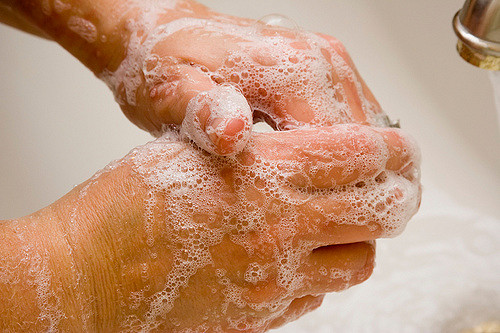Staying Healthy in Cold & Flu Season
January 7, 2019 – 2:53 pm
 Here’s some useful information from the Center for Disease Control about how you can protect yourself from the flu and how to treat yourself and your host children should you get sick.
Here’s some useful information from the Center for Disease Control about how you can protect yourself from the flu and how to treat yourself and your host children should you get sick.
It is NOT too late to get a Flu Vaccine. Au Pair insurance does not cover immunizations, but there are lots of places to get flu shots for $30 or less. Check your local health department or stores with a pharmacy such as CVS, Target and Walgreens. If a host family is insisting that their au pair get a seasonal flu shot and she agrees to get it, the host family would be responsible for the expense.
An Ounce of Prevention
There are steps you can take in your daily life to help protect you from getting the flu.
- Wash your hands often with soap and water or an alcohol-based hand sanitizer
- Avoid touching your eyes, nose, or mouth. Germs spread this way.
- Try to avoid close contact with sick people
- Practice good health habits. Get plenty of sleep and exercise, manage your stress, drink plenty of fluids, and eat healthy food
- Cover your nose and mouth with a tissue when you cough or sneeze. Throw the tissue in the trash after you use it
- If you are sick with flu-like illness, stay home for at least 24 hours after your fever is gone without the use of fever reducing medicine.
Symptoms of the Flu
The flu and the common cold have similar symptoms. It can be difficult to tell the difference between them. Your healthcare provider can give you a test within the first few days of your illness to determine whether or not you have the flu.
In general, the flu is worse than the common cold. Symptoms such as fever, body aches, tiredness, and cough are more common and intense with the flu.
Flu symptoms include:
- A 100oF or higher fever or feeling feverish (not everyone with the flu has a fever)
- A cough and/or sore throat
- A runny or stuffy nose
- Headaches and/or body aches
- Chills
- Fatigue
- Nausea, vomiting, and/or diarrhea (most common in children)
Treating the Flu
You can treat flu symptoms without medication by:
- Getting plenty of rest
- Drinking clear fluids like water, broth, sports drinks, or electrolyte beverages to prevent becoming dehydrated
- Placing a cool, damp washcloth on your forehead, arms, and legs to reduce discomfort associated with a fever
- Putting a humidifier in your room to make breathing easier
- Gargling salt water (1:1 ratio warm water to salt) to soothe a sore throat
- Covering up with a warm blanket to calm chills
Children are at higher risk for getting the flu because their immune systems are not fully developed. If your host child gets sick, always ask your host parents before giving any medications to the children. There are strict guidelines for dosages and they MUST be followed. Never give aspirin to children or teenagers who have the flu. Giving aspirin to children with the flu can cause a rare but serious illness called Reye’s Syndrome. Read ingredient labels on over-the-counter medications carefully to ensure they do not contain aspirin.
Photo: Arlington County
Do You Need Sports Insurance?
January 28, 2019 – 4:57 pm
 Trying out winter sports like ice skating, skiing and snow boarding can be very exciting, especially if this is your first time experiencing winter weather. However, you should also know the risks and be prepared.
Trying out winter sports like ice skating, skiing and snow boarding can be very exciting, especially if this is your first time experiencing winter weather. However, you should also know the risks and be prepared.
Is it risky to do winter sports without the sports insurance?
Yes. If you have to pay your own hospital bills for a broken bone, you might be shocked at how much that would cost. I checked this website for some cost estimates.
Here are a couple examples:
- Without medical coverage, to treat a broken arm or leg (that does not require surgery) it could cost up to $2,500.
- Without medical coverage, to treat a broken arm or leg (requiring surgery) it could cost $16,000 or more.
I wanted to make sure everyone understands how the medical coverage works for sports related injuries. There is a list of “high-risk sports/activities” that are not covered with the basic or upgrade medical insurance plans. Those activities are only covered with the Sports Insurance Package.
The Sports Insurance was available pre-departure and may also be purchased at any time during your year. It takes effect within 48 hours of your enrollment and it is good for 12 months. The cost will be the same ($90) whether you have a month left or your whole year ahead of you. I recommend you pay for it early on, if you didn’t already purchase it. You never know when an opportunity might present itself and you don’t want to miss out on an adventure. You also don’t want to take a risk on getting injured and being responsible for the bill on your own.
Below is a partial list of sports that are only covered with the sports insurance package:
Football, Rugby, Scuba diving, Ski-doo, Wakeboarding, Skydiving, Parachuting, Rock climbing, Zip line, Skate boarding, Rollerblading, Roller skating, Ice Skating, Skiing, Snowboarding, Snowmobiles & Snowshoeing. View the full list on your insurance brochure.
Note: Injuries sustained while partaking in these sports are covered with purchase of the Sports Insurance ONLY.
How to register for the Sports Insurance
Contact Lisa or Christine, if you are unsure which insurance package you have. To sign up, submit a completed copy of the Sports Insurance Enrollment Form along with payment to Au Pair in America. It takes three days for your coverage to begin. If you think you will be doing any of these sports, you should get it now.
